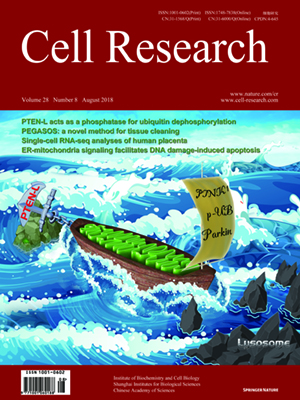
Volume 28, No 8, Aug 2018
ISSN: 1001-0602
EISSN: 1748-7838 2018
impact factor 17.848*
(Clarivate Analytics, 2019)
Volume 28 Issue 8, August 2018: 868-870
LETTERS TO THE EDITOR
Necroptosis of tumor cells leads to tumor necrosis and promotes tumor metastasis
Delong Jiao 1, Zhenyu Cai 1,2, Swati Choksi 1, Dan Ma 1,Moran Choe 1, Hyung-Joon Kwon 1, Jin Young Baik 1, Brian G. Rowan 3, Chengyu Liu 4 and Zheng-gang Liu 1
1Center for Cancer Research, National Cancer Institute, National Institutes of Health, 37 Convent Drive, Bethesda, MD, 20892, USA; 2National Center for Liver Cancer, Eastern Hepatobiliary Surgery Hospital, Shanghai, China; 3School of Medicine, Tulane University, New Orleans, LA 70112, USA and 4Transgenic Core, National Heart Lung and Blood Institute; National Institutes of Health, 37 Convent Drive, Bethesda, MD 20892, USA
Correspondence: These authors contributed equally: Delong Jiao, Zhenyu Cai.Correspondence: Zheng-gang Liu (zgliu@helix.nih.gov)
Dear Editor,
Foci of cell death are commonly observed in core regions of solid tumors as a result of inadequate vascularization and subsequent metabolic stresses such as hypoxia and glucose deprivation. Since the morphology of dead tumor cells appears to be necrotic, it is often referred as tumor necrosis. Tumor necrosis has been found to be associated with tumorigenesis and poor prognosis for years,1 but the role of necrosis in tumor development is still largely unknown. Additionally, the molecular mechanism of necrosis is an under-studied area due to the lack of experimental system for manipulating necrotic cell death. Necroptosis is a form of programmed, caspase-independent necrosis.2 Studies on TNF-induced necroptosis have improved our understanding on the molecular mechanism of necroptosis. It is now known that the protein kinases receptor interacting protein kinase 1 (RIPK1), RIPK3 and the mixed lineage kinase domain-like (MLKL) constitute the core of the necroptosis machinery.3,4,5 Importantly, RIPK3-mediated phosphorylation of MLKL results in MLKL oligomerization and its subsequent translocation to the plasma membrane.6 Necroptotic pathway may be involved in tumorigenesis,7,8 yet it is not clear if tumor cells undergo necroptosis during tumor development and if so, what role does necroptosis play in tumorigenesis and tumor metastasis. In this study, we demonstrated that necroptosis of tumor cells is responsible for tumor necrosis and is critical for metastasis.
https://doi.org/10.1038/s41422-018-
FULL TEXT | PDF
Browse 2120


